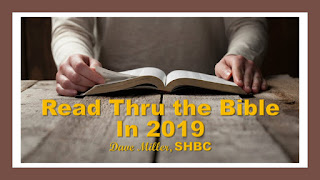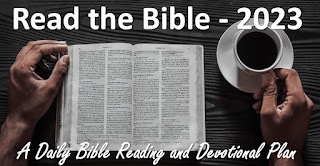"Believe in Yourself?"January 19 Readings: Genesis 39-40, Matthew 13:1–17, Psalm 11, Proverbs 3:5-6
Today's Readings - Genesis 39-40, Matthew 13:1–17, Psalm 11, Proverbs 3:5-6
Devotional - Believe in Yourself?
- Believe in yourself.
- If you can believe it, you can achieve it.
- Follow your heart.
- Trust your conscience.
- You create your own reality.
- No one can tell you what is right for you - only you can decide that for yourself.
Whether it is the advice of Yoda or the message of a Disney movie, this is the relentless drumbeat of our culture. The best way - no, the only way - to live life is to believe in yourself, to trust your own instincts and to follow your own heart. This teaching has even been baptized and found its way into the church in recent years, from Norman Vincent Peale and Robert Schuller to modern "therapeutic moral deism" in the pulpit, many have adopted this life philosophy of self-reliance, self-esteem, self-assurance, and self-confidence.
There is no doubt it is a popular one today. We want to hear that we create our own reality, that it is all up to us. I want to be the "master of my fate" and the "captain of my soul." The problem with this is that it runs afoul of the revelation of Scripture - badly so. Proverbs 3:5-6 is a well-known and familiar passage, so much so that we can fail to realize how stark and forceful the message is.
Trust in the Lord with all your heart,
and do not lean on your own understanding.In all your ways acknowledge him,
and he will make straight your paths.
First, we are to trust in the Lord with all our hearts. To trust means to believe in and rely on, to depend upon. If I am trusting in God, it means that I am living my life based on his resources, his power, his provision and his guidance, not my own. I cannot both believe in myself and believe in God at the same time, no matter how many motivational gurus call me to do so. A Christian must place his faith and trust, his very life, in the hands of the Father in heaven and live in dependence upon him.
In Hebrew parallelism, Solomon drives home that point by making the opposite point. We must, as we trust in God, not lean on our own understanding. That word is based on the Hebrew root word "between" and has the idea of judging between options, picking between right and wrong. To trust in God requires that I not trust myself or in my own ability to figure out what is right and what is wrong. I am a sinner, and sin has broken my conscience so that my own ability to figure things out and to decide what is right. If I rely on my own conscience and decide right and wrong for myself, I will continually make wrong choices that will lead my life astray.
The third assertion is that in all my ways I must acknowledge him. I must consciously acknowledge the right of God to have authority and control over every area of my life, over every choice that I make, over everything that I do. He is Lord and I am not. I don't run my own life, but I acknowledge his supreme authority over all.
When I do these things, when I trust God with all my heart instead of my own understanding and conscience, when I acknowledge his Lordship over every area of life and follow him in obedience, he will "make my paths straight." That doesn't mean it will always be easy. No one can read the Bible and with a straight face say that a Christian has the expectation that life ought to be easy for a follower of Christ. But it does mean that God will guide and direct me in my life so that I can walk in his ways and according to his will.
That is the life that I want. But it requires that I give up living according to my own wisdom and will, that I reject my own conscience and that I refuse to "believe in myself." I trust in him instead and follow him in all things, then he will direct my paths.
Father, forgive me for the many times I have followed my own wisdom instead of yours. I trust in you, recognizing that my own wisdom is so flawed and sin-skewed. I acknowledge your right to rule everything in my life. Guide me in your ways as I trust in you.
Think and Pray
Which of the readings spoke most powerfully to you today?Is the Spirit of God moving you to repent of something you are doing, to begin something new, or to change something about your life as a result of your readings? What?
Do you commit the sin of self-confidence or do you trust in God?
The two are mutually exclusive according to Scripture.
Who is Lord of your life - your own understanding, ideas, and will, or God and his word?



Comments
Post a Comment